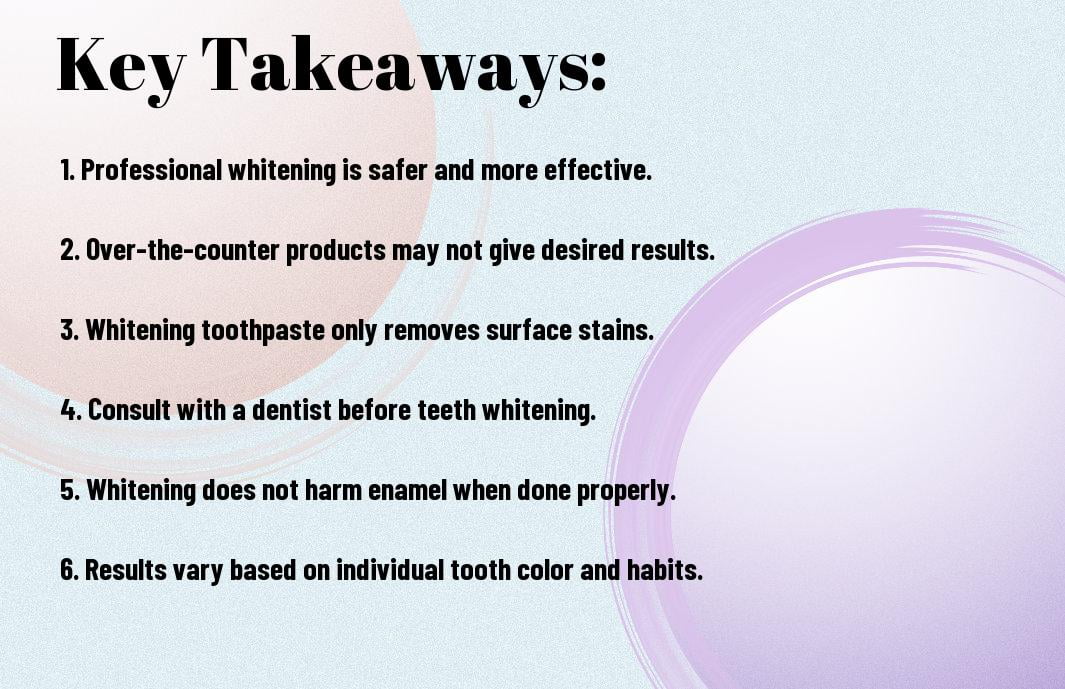There’s a vast array of information, myths, and misconceptions surrounding teeth whitening procedures. With so many opinions circulating, it’s necessary to separate fact from fiction when it comes to enhancing your smile. In this blog post, we will debunk some of the most prevalent myths about teeth whitening to help you make informed decisions about your dental care. From the safety of whitening agents to the effectiveness of over-the-counter remedies, let’s set the record straight on what really works and what doesn’t when it comes to achieving a brighter, whiter smile.
Key Takeaways:
- Professional guidance is vital: Consulting a dentist before teeth whitening is crucial to determine the right treatment plan and avoid damaging teeth or gums.
- DIY methods can be risky: Over-the-counter products may not be effective or safe for whitening teeth and could lead to sensitivity or uneven results.
- Maintenance is key: Keeping up with regular dental cleanings and avoiding staining foods and drinks can help maintain a brighter smile after whitening treatments.

Understanding Teeth Whitening
While there are many misconceptions surrounding teeth whitening, it remains one of the most popular cosmetic dental procedures. Understanding how teeth whitening works can help you make informed decisions about enhancing your smile.
What is Teeth Whitening?
One of the most common myths about teeth whitening is that it damages the enamel. In reality, teeth whitening is a safe procedure when done under the supervision of a dental professional. It involves using bleaching agents to remove stains and discoloration from the teeth, resulting in a whiter and brighter smile.
The Process of Teeth Whitening
With advancements in technology, there are now various methods of teeth whitening available, including in-office treatments and at-home kits. The most common method involves applying a whitening gel containing hydrogen peroxide or carbamide peroxide to the teeth, which helps break down stains and lighten the enamel.
Plus, it is important to note that over-the-counter whitening products may have lower concentrations of bleaching agents, which can result in slower or less noticeable results compared to professional treatments. It is always best to consult with a dentist before starting any teeth whitening regimen.
Myth vs. Reality
Myth 1: Teeth Whitening Damages Enamel
Any concerns about teeth whitening damaging enamel are unfounded. When done correctly, professional teeth whitening from a reputable dentist should not cause any harm to enamel. In fact, the American Dental Association (ADA) states that whitening products with the ADA Seal of Acceptance have been thoroughly tested for safety and effectiveness, ensuring they do not harm the enamel.
Myth 2: Whitening Results Are Permanent
Any notion that teeth whitening results are permanent is a misconception. While teeth whitening can provide long-lasting results, it is not a permanent solution. The duration of whitening effects can vary depending on individual habits such as diet, oral hygiene, and lifestyle choices. Touch-up treatments may be necessary to maintain the brightness of your smile over time.
Myth 2: Whitening Results Are Permanent. It is crucial to understand that teeth whitening treatments may require maintenance to keep your smile bright and white.
Safe Teeth Whitening Practices
Professional vs. At-Home Methods
Now, when it comes to teeth whitening, you have two main options: professional treatments at the dentist’s office or at-home methods. Professional treatments are typically quicker and more effective, as they use higher concentrations of whitening agents. However, they can be more expensive. On the other hand, at-home methods are more affordable and convenient, but they may take longer to see results and require consistent use to maintain whiteness.
Reading Labels and Following Instructions
Any teeth whitening product you use, whether it’s from your dentist or over-the-counter, must be used according to the instructions provided. Reading labels and following instructions is crucial to ensure safety and efficacy. Overusing whitening products or using them incorrectly can lead to damage to your teeth and gums, such as increased sensitivity or irritation.
To protect your dental health, it’s necessary to be vigilant in following the recommended usage of any whitening product. Consult with your dentist if you have any concerns or experience any adverse effects.

Potential Side Effects of Teeth Whitening
Sensitivity and Gum Irritation
For some individuals, teeth whitening treatments can lead to temporary sensitivity or gum irritation. This occurs as the whitening agents penetrate the enamel and reach the dentin layer, where the nerve endings are more exposed. It is imperative to follow the recommended guidelines and consult with a dentist to address any discomfort.
Overuse and Its Consequences
Whitening teeth excessively or using products with a high concentration of whitening agents can have adverse effects on dental health. Overuse can lead to enamel erosion, tooth sensitivity, and even chemical burns on the gums. It is crucial to adhere to the recommended usage instructions and seek professional guidance to prevent any long-term damage.
Summing up
Considering all points, it is vital to separate fact from fiction when it comes to teeth whitening. Myths such as damaging teeth enamel or causing tooth sensitivity have been debunked through scientific evidence. Consulting with a dental professional and using approved products can help achieve a brighter smile safely and effectively. By dispelling common myths about teeth whitening, individuals can make informed decisions and experience the benefits of a whiter, healthier smile.
FAQ
Q: What are some common myths about teeth whitening?
A: One common myth is that all teeth whitening treatments are harmful to enamel. In reality, when done properly, teeth whitening is safe and effective. Another myth is that natural remedies, like charcoal or lemon juice, are just as effective as professional whitening treatments. Lastly, some people believe that teeth whitening results are permanent, but in fact, touch-up treatments are often necessary to maintain a bright smile.
Q: Is teeth whitening safe for everyone?
A: Generally, teeth whitening is safe for most people, but there are some exceptions. Pregnant or breastfeeding women should avoid teeth whitening treatments, as well as individuals with sensitive teeth or gum disease. It’s always best to consult with a dentist before starting any whitening regimen to ensure it’s safe for your specific dental health needs.
Q: How long do teeth whitening results last?
A: The duration of teeth whitening results can vary depending on individual habits and lifestyle choices. On average, professional teeth whitening results can last from six months to two years. To prolong the effects, it’s important to practice good oral hygiene, avoid stain-causing foods and beverages, and schedule regular touch-up treatments as recommended by your dentist.





